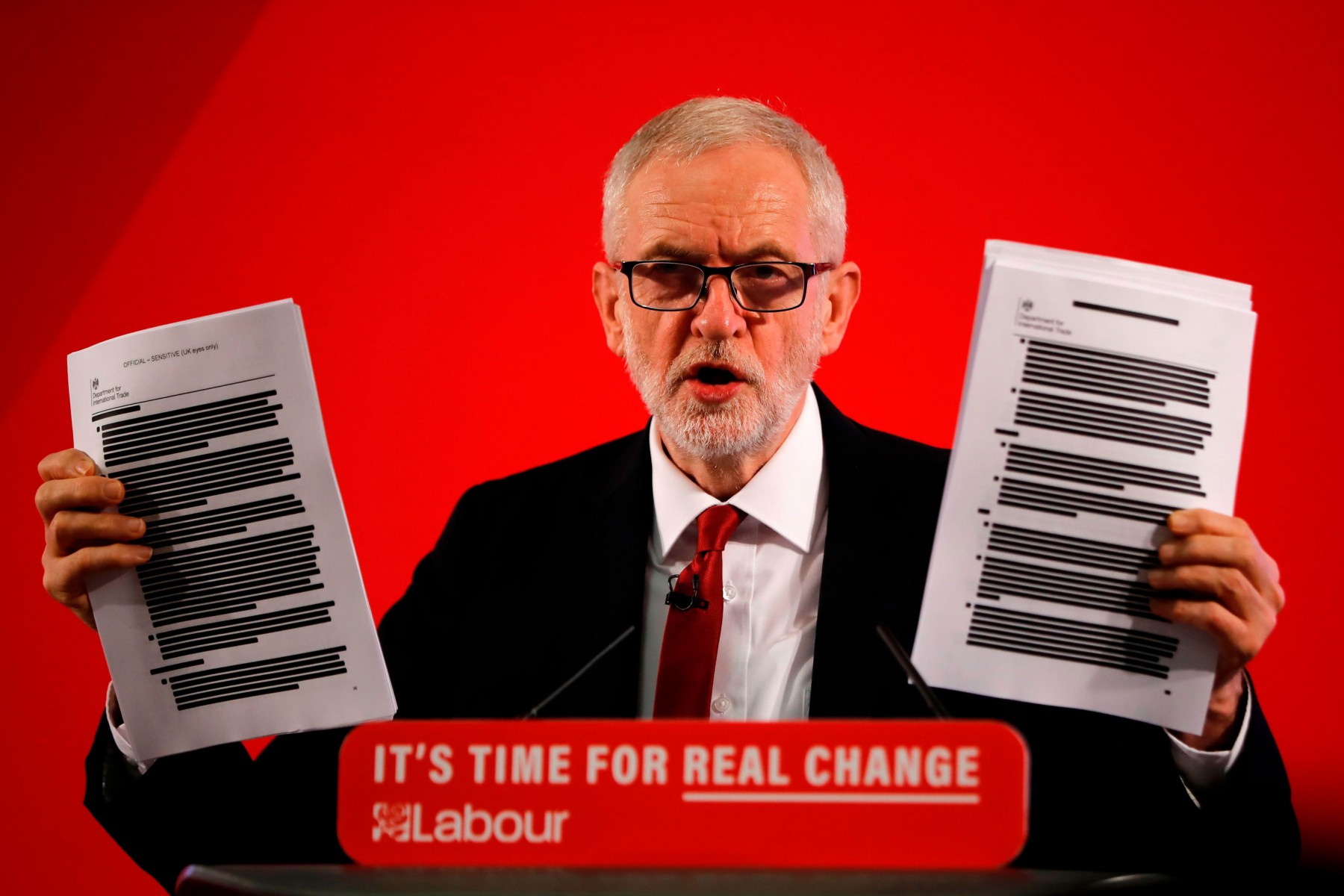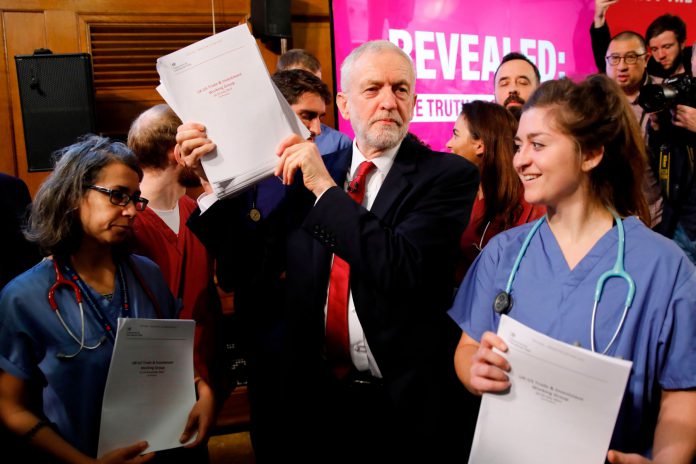JEREMY Corbyn claimed today to have damning evidence that the NHS was up for sale in a trade deal as he brandished hundreds of pages of leaked documents.
But upon a closer look, there were only four actual mentions of the NHS in the dossier, and experts have now said his claims the NHS was up for sale were “silly”.
The so-called evidence presented as “advanced talks” shows nothing more than low-level “early discussions”, they said.
Independent health think tank The Nuffield Trust, said a mention of access to drugs was “exactly what you would expect to see” in the early stage of negotiations.
Mark Dayan, head of public affairs, told HOAR Online: “Clearly they show the NHS is not being sold – that’s always been a bit silly.”
The papers are detailed readouts from the meeting – explaining what happened in six rounds of talks between London and Washington between July 2017 and July 2019.
Here are the four mentions of the NHS in Corbyns evidence explained:
1.Meeting November 2 2018, between Department for International Trade and US officials:
The first mention of the NHS was in relation to a trade meeting between Government representatives and US officials.
It was explained to the US team that there had been a public consultation on future trade deals and one of the themes that cropped up was “NHS protection and high food standards”.
Simple.
2. Meeting on November 5, 2018, with the UK and US delegations team
One official said “some responses had been related to campaigns led by NGOs [Non Government Organisations] with echoes from TTIP [Transatlantic Trade and Investment Parntership] (NHS, ISDS, food standards).”
Here he’s simply explaining again what issues came up in the public consultation.
Again, we’re nowhere near an actual trade deal here, just the themes from an open call for thoughts.
3. After a meeting about intellectual property trade agenda on 14 November 2017, the NHS was noted in relation to getting access to “generic” drugs in future
An internal memo from the DIT reads: “The US also said that the current Administration may want a shift in some areas of policy here so they were unable to answer some of the questions we posed.
“It was nevertheless a very helpful exposition on the key areas we can expect the US to push in an FTA [free trade agreement] and for us to start to determine the areas where we may find ourselves in difficult territory.
“The impact of some patent issues raised on NHS access to generic drugs (i.e. cheaper drugs) will be a key consideration going forward.
“Biologics were hugely contentious under TPP so one we were interested in discussing but unclear how far apart we are in this area.”
The documents, therefore, show the US is interested in talks around the price of drugs.
Mr Dayan told HOAR: “They (the documents) do show the US is pushing to try and get changes to the way we pay for medicines.
“But these are very early discussions, and a long way from an agreement.”
Mr Dayan said it is clear from the documents today that the UK has “clearly argued against this”.
The patents issue at the heart of this mention refers to the fact that pharmaceutical firms in the US can apply patents, or drug exclusivity deals, to their research therefore preventing other firms from producing cheaper versions of their drug for 12 years.
In the UK, that limit is just 10 years.
Crucially, when a patent expires the NHS is able to buy cheaper versions of that drug which is obviously good news for the NHS budget.
The US officials want to try and ensure their rules are enforced in the UK – which would mean US drugs’ companies can charge full price for an 2 extra years.
Mr Dayan said: “The US think their pharmaceutical companies could make more money.
“In the UK, it is the responsibility of the government to pay for the NHS in a way US governments don’t have to, so they’re the ones buying these drugs.”
He highlighted that while the US might want these things, that doesn’t mean it’s a done deal.
In similar negotiations with other countries recently, the US have failed to get their own way.
“In other, recent, trade deals the US has often not got its way on issues like this,” Mr Dayan said.
“In deals with Canada, Mexico, this didn’t get through.”
4. An internal document on initial trade negotiation discussions
The fourth mention of the NHS is discussing how America’s insurance system could affect talks.
But officials said: “We do not currently believe the US has a major offensive interest in this space.”
They added in an internal memo: “We will need to be able to go into more detail about the functioning of the NHS and our views on whether or not it is engaged in commercial activities.”

Sam Lowe, senior research fellow at the Centre for European Reform, told us: “What this boils down to is largely what we knew already – the US is asking us for things.
“Will the US want to discuss medicine prices? Absolutely, they will.
“Will the UK concede to their demands? We don’t know, but the Government is saying no.
“This tells us what is being discussed, but not the outcome.”








